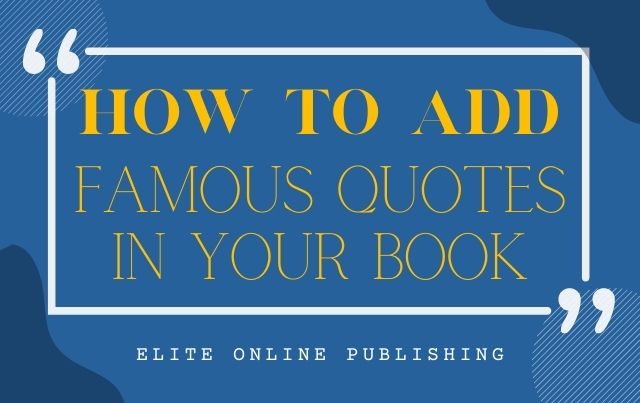How to Add Famous Quotes in Your Book
Adding a quote to your book or website has been a popular trend for several years now. It’s a great way to capture the essence of your writing in a few words and set the tone for what’s to come. Adding someone else’s quote can also be used to add endorsement, or unconscious social approval to your own words. However, using quotes in your published work can be tricky, and it’s best you know the rules beforehand.
As a common practice, all quotes are copyright to the author, which means that legally you should get permission from the author you hope to borrow from. This can sometimes be very difficult if the author is deceased or a public figure. If you’re going to quote someone’s words, even if you appropriately attribute the quote to the rightful owner, you should have their permission. Many commonly cited authors don’t mind having their famous lines reused, but some do, so tread carefully. Always get legal advice, or if in doubt, leave it out.
Remember: When Including Famous Quotes in Your Book:
-
-
- Attribute the Right Author
- Check the Correct Wording
- Display Your Quotes Properly
-
Attribute the Right Author
If you are going to include a quote, do it well. Ensure you’re quoting the right person and not someone who pulled those lines from someone else. Over time, the wording of quotes changes in common usage. Many famous passages are commonly attributed to a specific author, despite them not being the original creator. A couple of popular examples:
“Well-behaved women seldom make history.”
-Laurel Thatcher Ulrich
Sometimes the word ‘seldom’ is seen as ‘rarely,’ but ‘seldom’ is the correct wording. The quote is often attributed to Marilyn Monroe—and could be seen as something she would say—but this quote is actually from a 1976 essay by historian and Pulitzer Prize winner Laurel Thatcher Ulrich.
“I disapprove of what you say, but I will defend to the death your right to say it.”
-Evelyn Beatrice Hall
This line is attributed to Voltaire but was written by one of his biographers, Evelyn Beatrice Hall, in her 1906 book The Friends of Voltaire. As with many misquotes, it was paraphrasing the famous person’s attitude and was eventually mistaken for being his own words.
How to Check Your Quotes
Type your quote or a pertinent phrase into your internet search bar and see what you find. There is usually a wealth of places where your quote appears: novels, textbooks, magazines, and even music. You will have to sift through this (sometimes monotonous) array of info to find the pieces that are most helpful to your intended use of the quote. This might be historical discussions, literary pages, comedic relief, etc.
Online Research Tools
Wikiquote is a great resource that has quite a lot of reader-supplied research. This site compiles their research collaboratively, so there is some vetting of information, but you will need to use your judgment once again.
From there, you can often find the website of the author or a trustworthy source, so you feel confident that you have the correct wording for your passage and the author’s name spelled correctly.
With a bit of detective work and and enhancing your self-publishing foundation, you can effectively track down quotes as well as the fascinating history behind them.
How to Display Your Quotes
You’ll need to follow traditional referencing and citation rules for technical books, reference papers, and longer quotes.
The advice below relates to single-sentence quotes used in blogs or modern books.
Just like how you would format a book, formatting your quotes is just as important. You can display your quotes in all sorts of ways; the important thing is to be consistent throughout. Consistency of style is paramount.
- Double quote marks around the quote.
- Capital letter at the start of the quote.
- Full stop at the end of the quote, inside the quote marks.
- Quotes usually in another font (or italics) to your body text.
- Author of the quote written underneath in the font used for the body of your text.
An example using one of my favorite quotes:
“A ship in harbor is safe, but that is not what ships are built for.”
– John A. Shedd
Quotes can add instant connection and depth for your readers. Getting them right will enhance your work and honor the legacy left by those who have created these eloquent sound bites.




0 Comments